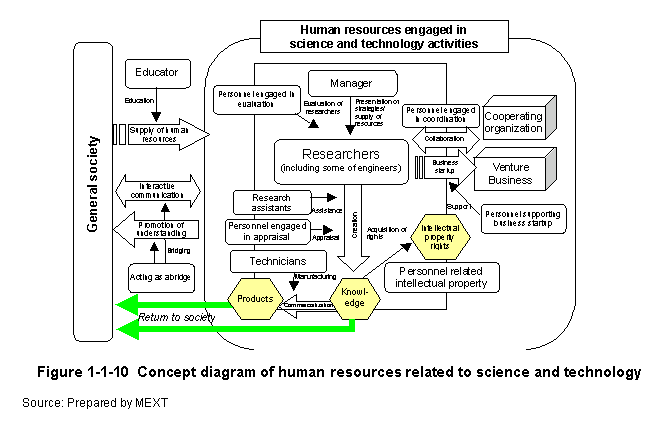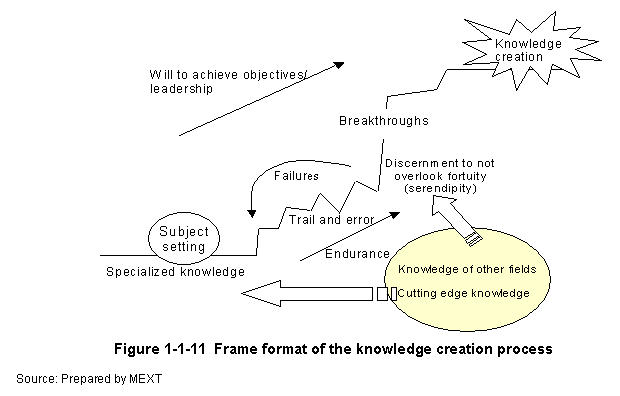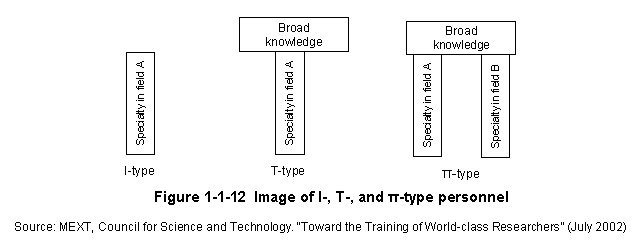| Home > Policy > White Paper, Notice, Announcement > White Paper > WHITE PAPER ON SCIENCE AND TECHNOLOGY2003 > Part1 1.1 1.1.2 1.1.2.1 | ||
| (The knowledge creation processes and the skills required of researchers) |
Researchers play the primary role in the creation of"knowledge."There are two kinds of knowledge.There is knowledge with inherent value,such as that typified by academic research,and there is knowledge designed to impart social and economic value in the form of future manufactured goods developed in research conducted by businesses.Both kinds of knowledge,however,are created.The part that researchers are required to play is to exhibit their creative abilities in order to yield knowledge.
How is knowledge created,and what kinds of skills do its creators need?

Figure1-1-11 shows a simplified frame format of the knowledge creation process.The starting point in the creation of knowledge is to first es-tablish a question against a backdrop of specialist information.Since the conclusive factor in the suc-cess or failure to create knowledge is often a matter of whether a definite hypothesis or subject can be set at this point,researchers need to have an exceptional ability to formulate questions and superior conceptual power.The goal of"knowledge creation"is,on the one hand,reached by overcoming numerous difficulties.It is reached through a process of trial and error,and in general,successes are accompanied by a number of failures.To learn lessons from mistakes and proceed to the next step requires a strong will and endurance to achieve objectives,as well as leadership in the case of team R&D.Moreover,the process of creation consists not only of gradual progress,but also of possible breakthroughs,for which often requires the discernment to not overlook the fortuity of seren-dipity 1) .Furthermore,new knowledge developed at other institutions or overseas and knowledge accumulated in other fields are often important factors in the establishment of definite questions and the generation of breakthroughs.Farsighted and broad vision,therefore,is one of the skills required of researchers to produce outstanding results.In this way,a great variety of skills are required of researchers who engage in the creation of knowledge.
Note1)The word serendipity was coined by the18th century English author Horace Walpole,who invented the word in connection with the tale The Three Princes of Serendip.The word means the faculty of discovering unanticipated good fortune.Serendipity does not rely on chance alone,but requires the discernment to not overlook it(see FY2000 Annual Report on the Promotion of Science and Technology).

| (Qualities required of researchers as pioneers) |
During the time when research and development followed in the footsteps of Europe and the United States,Japanese creative abilities were exhibited in areas such as the improvement of existing tech-nologies,advancement of manufacturing technolo-gies,and enhancement of production management.In the era to come,however,the Japanese will be expected to demonstrate their creativity as leaders,not followers.
The Council for Science and Technology,Ministry of Education,Culture,Sports,Science and Technology(MEXT),Established the Committee on Human Resources in October2001in order to study and examine,across a broad spectrum,the human resources needed to realize a nation of creative science and technology.The Committee is proceeding with its examinations.In July2002,it prepared its first recommendation in,"Toward the Training of World-class Researchers."The recom-mendation pointed to the importance of researchers who,from now on,do not confine themselves to being bottled up within their own specialties,but rather hold interests in various areas,from fields surrounding their own to completely unrelated disciplines,and also to the ability to proceed with their own research while maintaining an outlook that is not constrained to the boarders of existing specialties.The recommendation also indicated that,in general,such abilities are lacking in Japanese researchers compared with top-class re-searchers in Europe and the United States.Given this factor,the recommendation pointed out that"high expertise founded upon broad-ranging know-ledge"is precisely the kind of"genuine expertise"that researchers will need in the times to come.As such,it was indicated that it is important to foster personnel who combine deep expertise with broad knowledge(known as T-type and π-type),and not just those who excel in one specialty(I-type) (Figure1-1-12) .

| Back to Top | MEXT HOME |